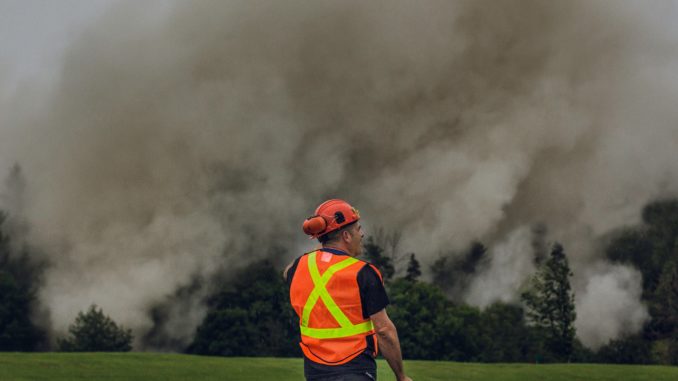
Nearly nine million acres burned in wildfires in the United States in 2018. Wildfires are a reality in Northern Colorado. While wildfires themselves present risks including danger to our homes and property smoke from wildfire is harmful to air quality and health. Damage from smoke can render a home uninhabitable even if the flames were contained to one room.
Smoke from regional or local wildfires can travel long distances and be inhaled into the lungs causing negative health effects. Smoke is made up of a mixture of gases and particles, including fine particulate matter, which can cause irritation to the eyes, coughing, wheezing, and difficulty breathing. These effects are worse for at-risk groups such as children, the elderly, and people with respiratory or heart problems.
Poudre Fire Authority (PFA) and the City of Fort Collins work together to help keep you informed and safe during wildfire season. Tips and resources help protect you and your property. PFA sends firefighters and information about the fire. The City of Fort Collins Air Quality program provides education and information on factors that can negatively impact air quality; including smoke from wildfires.
How to Know if Air Quality is Affected
Smoke travels, which means people can be impacted even when fires are miles away. If you see or smell smoke, air quality may be affected. If visibility is especially poor from smoke, (e.g., less than five miles or approximately the distance from downtown to the “A” rock formation near Horsetooth), then the air quality is likely impacted.
Mitigate the impacts of smoke if there is a wildfire in the area by:
- Closing your home’s openings, including attic and basement doors, vents, garage doors, and pet doors
- Staying indoors if possible
- Checking local air quality alerts to know if smoke is impacting air quality.
- Limiting physical activity
- Running the fan on “recirculate” in your home and vehicle
- Minimizing exposure to indoor air pollutants by avoiding activities such as burning candles or smoking inside
- Keeping car windows closed while driving
- Changing air filters regularly
The dry climate and warm temperatures make the risk of wildfires and presence of smoke part of life on the Front Range, but awareness and preparation work. Sign up or follow these channels to help the information come to you.
3 Ways to Stay Informed This Summer
- Sign up for smoke and air quality alerts at fcgov.com/aqdata
- Stay up to date on local fire risks and responses by following Poudre Fire Authority on social media @PoudreFire
- Sign up for local alerts at www.nocoalert.org – decide how and when to receive alerts
Support Northern Colorado Journalism
Show your support for North Forty News by helping us produce more content. It's a kind and simple gesture that will help us continue to bring more content to you.
BONUS - Donors get a link in their receipt to sign up for our once-per-week instant text messaging alert. Get your e-copy of North Forty News the moment it is released!
Click to Donate
